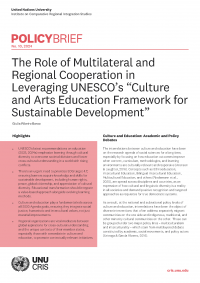The Role of Multilateral and Regional Cooperation in Leveraging UNESCO’s “Culture and Arts Education Framework for Sustainable Development”

UNESCO’s latest recommendations on education (2023, 2024a) emphasize learning through cultural diversity to overcome societal divisions and foster cross-cultural understanding in a world with rising conflicts.
There’s an urgent need to prioritize SDG target 4.7, ensuring learners acquire knowledge and skills for sustainable development, including human rights, peace, global citizenship, and appreciation of cultural diversity. Educational transformation should integrate a value-based approach alongside evolving learning methods.
Culture and education play a fundamental role across all 2030 Agenda goals, ensuring they integrate social justice, humanistic and intercultural values, not just material improvements.
Regional organizations are vital mediators between global aspirations for cross-cultural understanding and the unique contexts of their member states, especially those with a mandate in culture and education, to promote contextually relevant initiatives.
